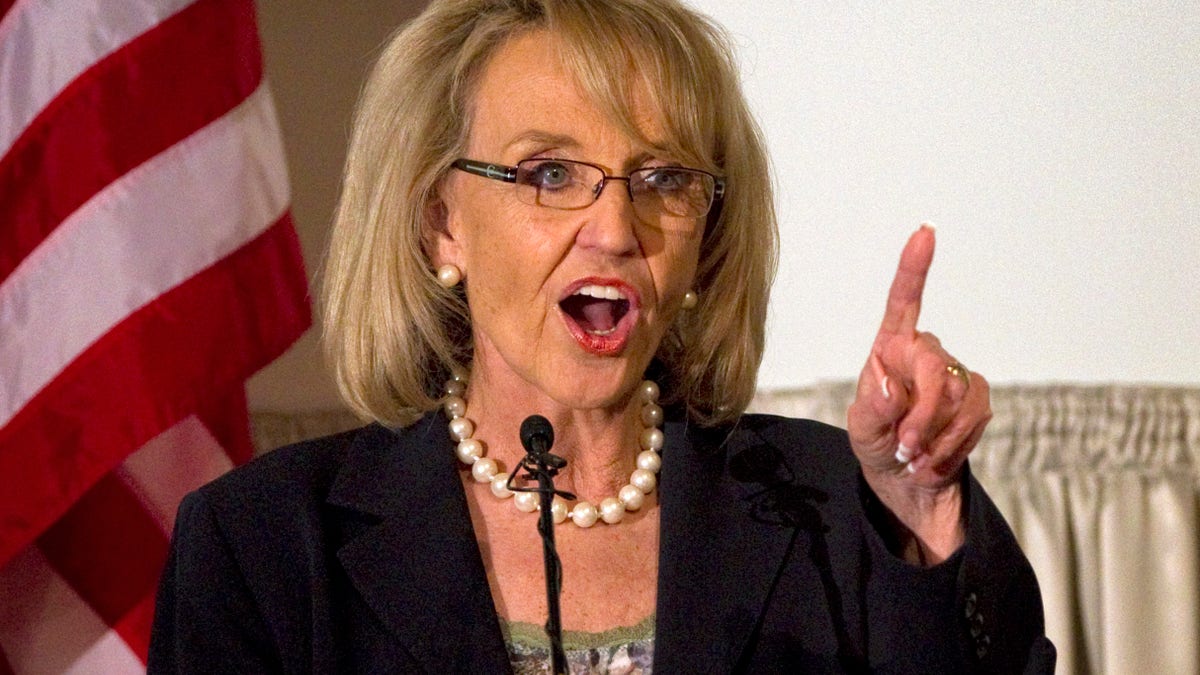
Arizona Gov. Jan Brewer, R, speaks Tuesday, April 19, 2011 at the Governor's Volunteer Awards luncheon in Phoenix. (AP) (AP2011)
Arizona joined another skirmish in the nation's culture wars this week when Gov. Jan Brewer signed a bill into law that gives married couples a tie-breaker preference over singles for state-arranged adoptions.
Under the new law, the state is to consider such factors as possible placements with the child's relatives, the prospective family's ability to meet the child's needs, and wishes of children 12 or older. But if all relevant factors are equal, the preference for married couples kicks in.
Gay-rights advocates oppose the law because they say it is based on discrimination against gays, who can't marry in Arizona.
"This is a law based on stereotypes and cultural assumptions about gay people being bad for kids," said James Essex, an attorney with the ACLU who specializes in LGBT issues. "The reality is the social scientists and the psychologists who study this say there is no basis for those stereotypes at all. That kids raised by gay couples do just as well on every measure of child adjustment that there is."
But social conservatives say the law is based on social science that shows children thrive in families led by traditional married couples.
"One thing that is quite clear from human experience and scientific studies -- children need a mom and a dad," said Wendy Wright, president of Concerned Women for America. "The claim that not allowing homosexuals to adopt would be damaging is without foundation. And the framework behind the idea that homosexuals should have the right to adopt is based on the desire of those who want to adopt rather than the interest of the children."
Arizona isn't the only state that imposes restrictions on adoptions.
Mississippi and Utah -- which also gives preference to married couples -- prohibit unmarried couples from adopting. North Dakota allows adoption agencies to deny prospective parents based on religious or moral objection.
Florida explicitly banned gays from adopting until a court overturned the law last year. And Arkansas banned unmarried couples from adopting until the state's high court struck it down this month.
Last week, a Senate committee in Illinois voted down a bill that would have allowed religious organizations to deny gay couples adoption and foster care services. In recent years, bills banning gay couples from adopting have failed in Tennessee, Kentucky and Ohio.
Essex says those efforts have failed because child welfare officials have testified to these lawmakers about the potential harm of those bills to children.
"So with the help of people who know what's going on, many of these proposals have not succeeded," he said, adding that it's unlikely that they ever will. "We're not seeing a wave of this."
Despite those victories for supporters of gay rights, they suffered another setback on Wednesday when Virginia's social services board voted down proposed regulations that would have allowed gay couples to adopt children in the state for the first time.
The state's Board of Social Services voted 7-2 to strip part of the proposed regulation that would ban private adoption services from discriminating based on sexual orientation. Virginia prohibits unmarried couples to adopt. Only married couples and singles, regardless of sexual orientation can adopt.
"For us, specifically, it feels like our community is under attack," said Robin McGhee, executive director of GetEQUAL, a gay rights group. She said the laws are part of a "proactive approach to keep us from adopting children who need homes."
There are 1.5 million children in the U.S. with adoptive parents. In 2009, there were about 55,000 state-arranged adoptions, according to the U.S. Health and Human Services Department.
About 250,000 children are being raised by gay parents, according to Lamda Legal, a gay-rights organization. But it's not clear how many of them are adopted since some of the parents are divorced.
Of the 424,000 children in foster care, about 130,000 are legally available for adoption, according to the Child Welfare League of America.
Jenny Tyree, a marriage analyst with the conservative group Focus on the Family, told FoxNews.com that she attributed the number of children waiting for adoption to red tape rather than a shortage of willing or able married couples. Tyree said the group's partnership with Colorado last year helped to reduce the number of children waiting for adoption by more than half, from nearly 800 to 365.
"Focus on the Family for more than 30 years has been helping more children grow up with a mother and a father," she said, adding that laws restricting adoptions to married couples "are in the best interest of children."
But McGhee said if that is the primary criterion for adopting children, then there should be laws requiring children to be taken from parents who get divorced. Instead, she said, the most important criterion should be ensuring the child is supported and loved.
"The people that are harmed by this (debate) are the children in our system," she said, adding that those who discriminate against prospective parents should be "focusing on their own family."




